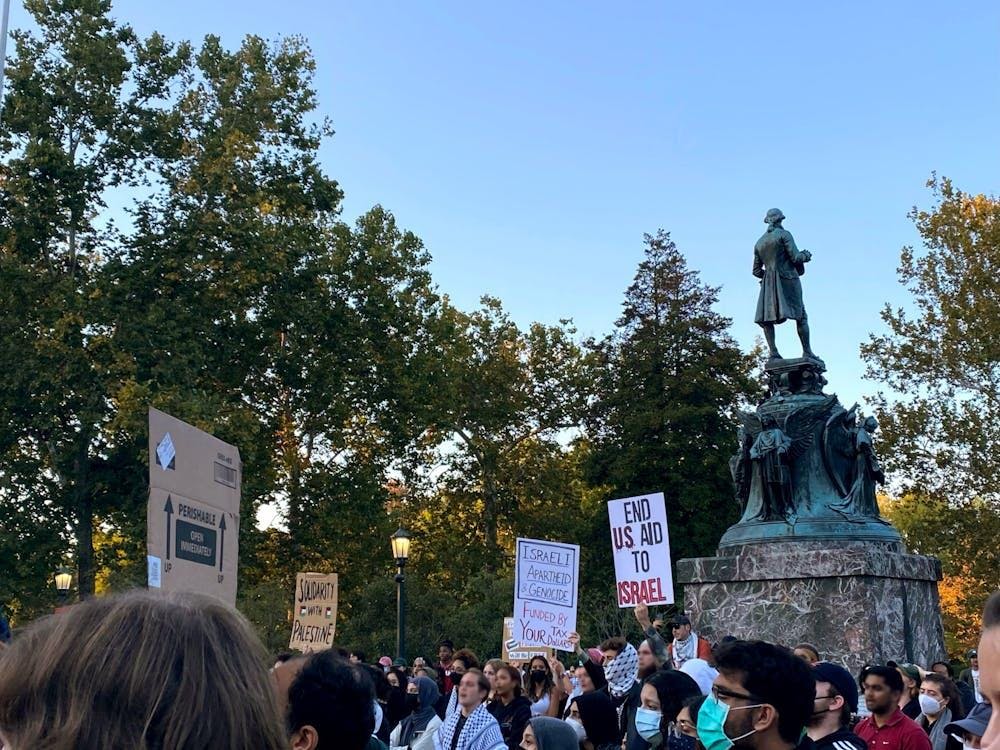Over the past year, multiple events have been hosted by differing groups to educate students and the general Charlottesville community about the ongoing genocide in Gaza. However, events rhetorically prioritized by the University have solely featured academic voices and disregarded the voices of people actually impacted by the crisis. This presents an incomplete discussion of the topic, as the absence of lived experiences and first-hand knowledge means that University conversations lack authenticity. The University must do a better job building understanding by listening to the voices of those with firsthand knowledge — relying solely on perspectives of those who have studied these issues academically makes an abstraction of what is a reality for millions of people.
To be clear, academic voices are extremely useful in understanding context — social, economic and historical — for any topic. Nevertheless, when the discussion surrounds a humanitarian crisis, especially one in which multiple activists wish to tell their stories, it is essential to provide spaces which uplift the narratives of those on the ground. This need for voices which directly illuminate human experiences is especially salient given the ongoing conflict in Palestine and now Lebanon.
Personal stories from those who have lived through the occupation provide an emotional resonance and insider perspective that academic analysis cannot capture. If an event is to be promoted as one that brings together differing opinions to educate University students about past and current events in Palestine, it should feature Palestinian voices, specifically those who have a direct and personal connection to the conflict. To foster constructive dialogue on the topic of a humanitarian crisis, we need the humanized voice to be the center of the discussion.
Unfortunately, over the past year, the University has largely only platformed academic perspectives about the ongoing conflict in Palestine and now Lebanon. Most prominent among these was the University-hosted event titled, “Enabling Difficult Conversations” with Tarek El-Ariss, Dartmouth College’s chair of Middle Eastern Studies, and Susannah Heschel, Dartmouth’s chair of Jewish Studies.
This lecture aimed to brief students on how to collaboratively debate and critically learn about such a divisive issue. The University made the effort to sponsor these speakers, but in doing so, did not engage authentically with the lived experiences of those most directly impacted by the conflict. This choice avoids any deeper debate on the topic past academical and philosophical concepts. While professors’ perspectives are valuable, it is important to recognize the limitations of their viewpoints compared to authentic Palestinian perspectives.
While “Enabling Difficult Conversations” offered valuable insights only for the pedagogical dimensions of debate, the University chapter of Students for Justice in Palestine's Teach-In, “Decolonization is Not a Metaphor: Gaza and Palestinian Liberation” exemplifies exactly the sort of human-centered events the University should work to foreground more. This teach-in, and others like it, emphasize uplifting the voices of Palestinian students, with several anonymous students sharing the stories of their family members in Gaza and the West Bank.
One speaker at the event read a piece from a Palestinian student at the University, where the writer specifically addressed the catastrophic impacts of occupation. These are not just narratives but lived experiences, essential voices that are crucial for properly educating others on the ongoing genocide and the broader genocidal history of Israel. By sharing these stories, the Teach-In illustrated the human cost of the occupation, making it clear that the crisis is not just political or historical but a deeply personal and ongoing reality for millions.
Given that student-run groups are hosting conversations that foreground stories, the University may hesitate to further inundate the scene. It is certainly true that the efforts of SJP and other organizations in spearheading these open forums are commendable. However, the University’s involvement and what it chooses to rhetorically platform signals important values to the community. If it were to more fully amplify these stories, it would create a more empathetic, informed community on Grounds that understands the human cost of geopolitical issues. Rather than limiting endorsement to solely faculty, the University can expand to a wider range of voices and importantly demonstrate its humanistic approach to academics more broadly.
Striking the balance between academic and human voices is especially important in relation to the Palestinian conflict. For 75 years, Palestinians have endured apartheid, ethnic cleansing and genocide under Israeli occupation, yet discussions on this issue often become detached, overlooking the human suffering which is at the core of this issue and turning it into a purely political question. Human lives should not be political. While academic analysis is useful for building a foundation for discourse, productive dialogue requires that we also amplify personal stories that highlight the reality of life under occupation.
We must push for the University to facilitate spaces where stories are heard and acted upon. This would create an environment that promotes not just intellectual engagement but real emotion that inspires more than mere conversations. These stories should drive action, education and understanding of the necessity for Palestinian liberation. Through this, I hope to see that future conflicts are discussed with an emphasis on human perspective, not academic expertise.
Ayat Younis is an opinion columnist who writes about academics for The Cavalier Daily. She can be reached at opinion@cavalierdaily.com.
The opinions expressed in this column are not necessarily those of The Cavalier Daily. Columns represent the views of the authors alone.







